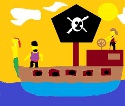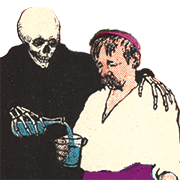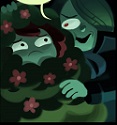|
CodfishCartographer posted:Random mechanic idea: I wonder how the opposite of a deckbuilder would work. Deckwhittler? Deckthinner? Basically instead of starting with a small deck and adding more and more cards to it, starting with a big deck and then removing cards from it as the game goes on to refine what it does. Not sure if this would be interesting in trying to make sure your deck does what it needs to do as it gets smaller and smaller, or if it would just feel lovely as you lose more and more options. I've seen this idea get thrown around a fair bit, in this very thread I think, but I don't think anyone has come up with a concrete example of how it would look... silvergoose posted:...bullshit? Never mind. Kashuno posted:A handbuilder. I've toyed with the idea a lot but it seems so hard to make a mechanic where you win while giving yourself less resources One way to do it would be to have it be that the cards you trash either buy you permanent buffs / vp / better cards. So for example you could trash three copper for a silver or something similar.
|
|
|
|

|
| # ? May 12, 2024 18:59 |
|
Couldn't you just have multipurpose cards, and when you play a card it stays out? Actually now that I think about it, it seems like a fun fine balancing act to act without draining your options entirely. You're meant to cycle the deck repeatedly so you need to have fluid tactics available, but you get to make hard choices in how and when to apply your increasingly limited resources. I like this a lot. Gonna be thinking about it. I'm kind of feeling a The Magic Goes Away vibe...Can't decide yet if the base is meaty enough on its own to stand up. Will have to rough out something and see.
|
|
|
|
Casnorf posted:Couldn't you just have multipurpose cards, and when you play a card it stays out? Actually now that I think about it, it seems like a fun fine balancing act to act without draining your options entirely. You're meant to cycle the deck repeatedly so you need to have fluid tactics available, but you get to make hard choices in how and when to apply your increasingly limited resources. What do you mean? Play a card, then each turn itís out it does X effect or gives Y buff? Anniversary posted:One way to do it would be to have it be that the cards you trash either buy you permanent buffs / vp / better cards. So for example you could trash three copper for a silver or something similar. I could see this working, definitely. Use the cards in your hand as currency to buy better ones, but when you spend them theyíre gone forever. I initially thought of the idea when trying to come up with an alternative for deckbuilders that kept player-unique themes. So all of my cards I could buy for my deck would be thematically appropriate for me, but not for your deck (instead of both of us taking from the same groups of cards to build our decks, and our strategies determining the theming)
|
|
|
|
for Hunters I've ended up using a system where cards have abilities that can be played but then that card gets removed from your deck. You also use these cards to upgrade weapons so it adds a bit of a resource management balancing act to the idea of thinning your deck. Not quite the same but it so far has had decent results for testing to create challenging decisions of what you want to do.
|
|
|
Anniversary posted:Never mind.  Not that it's a strict comparison, but the concept of starting with many, trying to get rid of all your cards, while losing options as you go. I mean, Uno, too, there's a bunch of card games using that idea, I feel.
|
|
|
|
|
So I've made some changes to the MH deckbuilder I pitched here a few weeks ago, if people would like to see the revised rules and give me some feedback that'd be awesome  https://docs.google.com/document/d/1PpgbciW1Ase3qqlo_9WFIx3ouvd9oC_Qdq_D1mKw04E/edit?usp=sharing https://docs.google.com/document/d/1PpgbciW1Ase3qqlo_9WFIx3ouvd9oC_Qdq_D1mKw04E/edit?usp=sharing
|
|
|
|
This is kind of meta-feedback, but I've been skimming through the last year's worth of posts (yours included) and I gave your rules a quick look-see and while they seem mechanical and comprehensive, they would not serve well as an outsider's (player's) guide. I caught that there were certain actions available and restrictions present but the actual game was abstracted enough that the big picture as a whole didn't click. There were also no concrete examples of monsters or gameplay snippets such that I didn't have adequate foundation to place the rules listed atop, so they slipped out of memory rather quickly. I know it's intended as a personal reference to the fellow with the vision, but it might receive better reactions if it were presented as a rulebook to new players. Even if that is a lot of extra effort for something that changes frequently.
|
|
|
|
Hammer Bro. posted:This is kind of meta-feedback, but I've been skimming through the last year's worth of posts (yours included) and I gave your rules a quick look-see and while they seem mechanical and comprehensive, they would not serve well as an outsider's (player's) guide. Oh gotcha! That makes sense and you're right that definitely is something I should include even for playtest versions. Especially now that I think on the games that I was playtesting for others this week, I had the same issue where I could read the rules packet they gave us to test with but they didn't flow well so it was confusing and some of the rules were lost even once we started playing. I'll definitely take that to consideration and set up an actual players guide with examples for testing.
|
|
|
|
CodfishCartographer posted:What do you mean? Play a card, then each turn it’s out it does X effect or gives Y buff? No. Each card can do one of several instant effects, but once you use one that's it. Combine that with a strategic map that determines what can be played where and a reason to play it and you have the base for a neat little start.
|
|
|
|
I'm prototyping a Deckbuilder + Minis game, and the last physical attempt was fairly encouraging. I'd like a digital assistant, but I'm a whiny babby and don't want anything that costs money, requires an account, or goes online. Anybody know of anything that makes it very easy to shuffle, draw, discard, and occasionally add or remove cards from a deck? There ought to be a pretty simple utility but everything I'm coming across is way overblown and violates the above requirements. Ideally it should handle multiple decks simultaneously, but presumably I could also just run extra copies of it. Kudos to whoever recommended nanDECK. After an hour or two of experimentation I'm now in a position to create new monster decks (everybody's doin' it) by trivially copying a few lines from a master spreadsheet.
|
|
|
|
CodfishCartographer posted:Random mechanic idea: I wonder how the opposite of a deckbuilder would work. Deckwhittler? Deckthinner? Basically instead of starting with a small deck and adding more and more cards to it, starting with a big deck and then removing cards from it as the game goes on to refine what it does. Not sure if this would be interesting in trying to make sure your deck does what it needs to do as it gets smaller and smaller, or if it would just feel lovely as you lose more and more options. Kashuno posted:A handbuilder. I've toyed with the idea a lot but it seems so hard to make a mechanic where you win while giving yourself less resources Casnorf posted:No. Each card can do one of several instant effects, but once you use one that's it. There's already a fairly well reviewed game that uses this exact mechanic. Flamme Rouge is a reverse-deckbuilder about cycling races. Each card represents each racer's energy reserves, and once they are spent, the cards are gone forever. The game works because the starting decks have more than enough energy to finish any of the races, it's just a matter of finishing first. I'm not sure how a reverse-deckbuilder would work without being some sort of a race. At least that way, you ensure that everyone can eventually finish, and it just becomes a matter of spending resources at the right time to finish first. golden bubble fucked around with this message at 20:53 on Jan 14, 2017 |
|
|
|
Hrm. What about a reverse deckbuilder where you set aside cards from your deck to build up a resource base to spend on playing cards/powering them up? Kind of like MtG's "land drop" mechanic, except you just get to take whatever card from your hand and say "this is a forest." As the game progesses your deck gets thinner and more focused, but you also get more ammo to spend. Presumably you'd have a lot of scaleable cards that can be pumped up, so you can do bigger things with the same cards as you dump more and more of your deck into your resource base.
|
|
|
|
I'm fairly certain some relatively popular CCG did something like that (star wars?). The main problem is that it kind of hosed the pacing of the game since you always were ramping up. This is only like a half-memory though so I could be wrong.
|
|
|
|
You could do it one better, then. Give each card 3 functions: play-for-effect, resource, and scoring objective. You remove cards from your deck to your resource area. Once in the resource area, they have an objective on them that you play cards towards completing. When you complete an objective, you remove the card from the resource area to your score pile. First person to X objectives wins.
|
|
|
|
I do something similar for hunters right noW. Materials have abilities that cause them to be sent to a shared discard when used for abilities, but they can also be played to a smith to upgrade your equipment. Makes for an interesting decision between whether it is more useful to use the card for its ability or to bring you closer to ending the game
|
|
|
|
I got fed up with the existing deck simulators so I made my own: http://www.gastronok.com/CardBoard.7z Its main strengths are adding decks and cards on the fly. That and it's offline. Now back to playtesting the game I was working on -- this time without printing, cutting, and shuffling flimsy bits of paper.
|
|
|
|
Quick question regarding dice math: how many possible combinations of results are there in 5 6-sided die, ignoring the 6? Kinda like 1-1-1-1-2, 1-2-3-4-5, 2-2-2-3-4, etc. Is there any easy way to calculate it?
|
|
|
|
Azran posted:Quick question regarding dice math: how many possible combinations of results are there in 5 6-sided die, ignoring the 6? If 6 is functionally 0 you would still get 6^5 combinations or 7,776 because you could get results like 0, 0, 0, 1, 2, 3 and so on.
|
|
|
|
Thanks!
|
|
|
|
al-azad posted:If 6 is functionally 0 you would still get 6^5 combinations or 7,776 because you could get results like 0, 0, 0, 1, 2, 3 and so on. When the order of the rolls doesn't matter, you want a combination with repetition. If by "ignoring the 6" you mean that you really want to roll 5 5-sided dice, the number of combinations is 9 choose 5 which is 126 outcomes. If a 6 is a zero but you keep it then you can get 10 choose 5 = 252 outcomes.
|
|
|
|
Yeah, that was basically what I was looking for, just had absolutely no idea how to express it because I'm really bad at maths. Thanks to both of you 
|
|
|
|
I decided to say "gently caress it" and made a chip version of my game, and my initial impression is that I like it a lot better. It also made me rethink a core mechanic: favor. Before, Favor had been an all purpose way of powering special abilities and leveling up. It was a cube, and similar to Fatigue, Delirium, and Dread (my damage tokens). I also had wildcards (part of the deck, obviously), which were a way to provide some flexibility to player decks by having numbered white cards that could be substituted for any check. While prototyping the player ability chips, I had an idea: why not combine these mechanics? I'm going to move forward with that idea. Favor now comes out of the chip bag like other ability chips, and as players are playing chips to meet checks they may either use Favor as a 1-value wildcard (based off other feedback that 2 and 3 value wildcards are too powerful), or they can spend it to their player card (to level up, or use their class ability), to items (where they serve as ammo), or to parts of the game board (where they act as keys for special events). If Favor is spent on anything non-wildcard, then it has a +1 card effect, so that it isn't effectively a sandbag. Thinking about it more, I'm becoming more and more interested in also moving my damage tokens to that same idea. Puzzle Fighter has Wound tokens, and it would be a similar idea. If you draw a Delirium, Fatigue, or Dread token, then it either takes up a dead spot in your draw (making it harder to hit checks), or you can move it to your player card (slimming down your deck), but also moves you closer to death by Madness or Exhaustion. This has also made me think about some other interesting interactions, namely that events / rewards / punishments could move special chips into your bag, e.g. dual-typed chips, +draw chips, etc.
|
|
|
|
Is there a good way to automate cards designed in illustrator into a template with all the cards that has its content filled by an excell or google docs version of excell?
|
|
|
|
Junkie Disease posted:Is there a good way to automate cards designed in illustrator into a template with all the cards that has its content filled by an excell or google docs version of excell? Nandeck could do this if you made the image files the entire size of the card, and then passed it to Nandeck with a script that read the filenames out of an Excel file. http://www.nand.it/nandeck/ Nandeck is pretty simple. The scripting is very similar to HTML, and it would mostly be putting the filenames into one column, and the amount of cards you want to produce for the deck in a second column, and then writing a script that says put FILENAME at THIS NUMBER of cards. It outputs to PDF.
|
|
|
|
So I recently got the idea to try creating a game using the same characters I'd designed for Essentia Tactics, taking away as many lessons from that as possible while also feeling like I could break some of the fundamental design concepts that were somewhat holding the game back. This resulted in an as-yet-unnamed prototype which has enough content for a 1v1 game. Design goals for this project include: maintain an emphasis on player choice, have meaningful interaction and decisions, reuse character archtypes that had already been developed and tested, and streamline the game loop. I have no clue how well any of these objectives have been achieved. Each player picks a class. Your class determines your Basic Action, Health, and Actions. At the start of the game each player selects an action in secret and simultaneously reveals them. The Action with a higher Time requirement goes first (in the case of a tie, both actions are discarded and the process is restarted). On a players turn they reveal their action, pay any costs (spending time and/or energy), are potentially interrupted by an opponent's Counter, resolve their action, place the action into your discard, and select an action for the next turn in secret, then their turn ends and the player with the most time begins a turn (this can allow a player to take multiple consecutive turns). When you take an action you spend time and/or energy on it. Each player begins the game with twenty time and zero energy. Some actions have a Counter ability. This ability is written Counter X - Effect. This means when your opponent has less time than you, and the difference is X or greater, you must activate the actions Counter ability. If you do, you resolve the Effect. When you are hit by an attack it causes Flesh Wounds. If you are hit by a second attack before healing those Flesh Wounds, all Flesh Wounds become Critical Wounds and then you take the new Flesh Wounds. If you ever have wounds equal to or greater than your Health you die (you also lose). Some actions have the Regain ability. When you take an action with Regain you may heal one Flesh Wound. If the action had Regain X you instead heal X Flesh Wounds. Some actions have the Heal X ability. When you take an action with the Heal X ability, you heal X Flesh Wounds. If this heals all your Flesh Wounds, and the number of Wounds healed was less than X, you may heal Critical Wounds equal to the difference. If you heal all your wounds, and the number of wounds healed was less than X, you Overheal. At the start of your turn you choose whether or not to reveal your action and play its listed abilities or to take a Basic Action. When you take a Basic Action, return all of you actions in your discard to your hand. Then spend one time. Then resolve your Basic Action ability (as determined by your class). Then place the card used to take this Basic Action into your discard face down. At the end of your turn, if you have more than three energy, you lose energy until you have three energy. Now for the two classes: Warlock posted:Warlock Knight posted:Knight I know that's a huge wall of text, but does that make sense? Any obvious problems from a read through? Anniversary fucked around with this message at 20:24 on Jan 23, 2017 |
|
|
|
It's hard to say precisely how things would play out just by reading that, and I realize things are still early in the design phase, but here's what comes to mind:
Recommended Reading Two games come to mind based on your synopsis. The first is Love Letter. A game for two to four players; there are only 15 cards in the entire deck and everyone shares them. On your turn you'll have exactly two cards in your hand, and you have to play one of them. This only gives you two options. Additionally, about half the cards have the opportunity to eliminate an opponent, so the stakes are high. At its core it's a game about reading your opponents and inferring which of the 15 cards they have. Everyone has the reference list telling them exactly how many cards are in the deck and what they do. The first clever part, though, is that before each game a single random card is removed from the deck. This creates an element of uncertainty -- you can't know exactly what they'll have, or if their actions (they only have two choices) were deliberate or circumstantial. The second clever part is that a round will take maybe five minutes once people know how to play. This allows there to be a sense of tension from the onset; every other card has the possibility to eliminate someone. But there's no opportunities to snowball (nothing's worse than knowing you'll lose but being forced to stick it out), and even if you are eliminated you won't be excluded for long. The other game that your game evokes is Mage Wars. This game had a lot of things going on but a few aspects seemed particularly relevant.
|
|
|
|
Thank you so much for this critical assessment! I should've mentioned, but there's no deck - you have those cards in hand and when you play them they go to the discard and they come back to your hand when you take a Basic Action - that said I think you're right about there being too few actions and I hope I'm not missing the forest for the trees with this feedback. As to not being punchy... yeah I'm going to have to figure out how to fix that / if I even can. The initial theme-ing was Bloodborne-inspired arena brawler (with the flesh wounds and regain system working like, well, Bloodborne's regain system) but I don't think the classes are evocative / unique enough yet. Anniversary fucked around with this message at 05:04 on Jan 24, 2017 |
|
|
|
Question, thread: whatís your favorite end-game condition? Either win or loss. Iím trying to think of what ways a game can end, to see if thereís any untapped potential there. While trying to list out all the endgame conditions board games generally have that I can think of: -preset # of rounds -fluctuating # of rounds -one player unlocks a specific card -all players unlock specific cards -defeat all opponents -defeat one specific opponent -one player reaches some level of points / resources -all players reach some level of points / resources each -some total # of points / resources is reached between all players -discovering / deducing some kind of hidden information -a set amount of real-life time has passed -a fluctuating amount of real-life time has passed -conquer a specific area -conquer a preset number of areas -conquer a fluctuating number of areas Any obvious ones I've overlooked? Any not-so-obvious ones you enjoy? Any really loving weird ones that you've never seen done before? CodfishCartographer fucked around with this message at 00:04 on Jan 26, 2017 |
|
|
|
CodfishCartographer posted:Question, thread: whatís your favorite end-game condition? Either win or loss. Iím trying to think of what ways a game can end, to see if thereís any untapped potential there. While trying to list out all the endgame conditions board games generally have that I can think of: That's a good question... I think that victory conditions will depend on the game, obviously, but one common thing I like between my favorite games is having 2 or more. Especially in Dominion. Being able to end the game on Highest VP pile, or on any 3-pile adds a lot to strategy. The 3-pile element enables a lot of alternate victory paths (and therefore makes Province / Big Money less dominant). Another thing that came to mind is King of *** games. Having both VP and player elimination makes for many different strategies, enabled by what cards are in the market row.
|
|
|
|
Also, brainstorming about different ways games can end makes me want to see more real-time games. Like maybe one where you can postpone the timer using ingame actions, like you could do a thing to add a minute to the timer. Or a game where the timer is relatively long, like twenty or thirty minutes. Long enough where at first youíre like ďpfft thatís plenty of timeĒ and donít need to worry about it, but then you realized you all dicked about too long and now youíve only got three minutes left and shitshitshitshitSHITSHITSHIT
|
|
|
|
Galaxy Trucker uses a timer where the "boldest player" flips the timer to begin and whoever finishes first sets the pace for the other players. I can see a fluctuating timer that's going down a linear track to an end game state and certain actions let you flip it without moving it or something. If you're tech savvy you could make an app that links everyone via Bluetooth and players can secretly input their actions which acts as a sort of initiative system you then carry out on the game board. Generally speaking I like my games to have a visible, fluctuating end condition. I want to have some influence over pacing and I want to see what that influence is doing whether it's depleting a thing or being the first to get a thing.
|
|
|
|
A game like Elder Sign also has a two stage timer. The main determinate of end-game is the doom track for the elder one you're fighting, but that's handled by a number of in-game factors (routinely by the movement of the clock), and can be bumped along by various random events.
|
|
|
|
I kind of like Jamey Stegmaier's achievement stars system for ending a game (in Euphoria and Scythe). It allows you to set the game time a little more precisely by changing the number of achievements necessary, and the finality of the game ending immediately when a player places their last achievement star helps players get a sense of the pace of the game as it goes. Also players can get a bit of a sense of how well everyone's doing, but the winner usually isn't super clear until the final scores are tallied.
|
|
|
|
So I've been mulling over this game idea for about a month now and I finally got a prototype out onto the table tonight. The game is based around the concept of athletics funding. Each player takes the role of an athletics body trying to win glory for its country during an Olympics cycle. Think USSR vs USA through the cold war, but down to a four year cycle. It's a card game that uses symmetrical decks to represent the countries, as well as a separate athlete deck to represent the field (the lesser countries that nonetheless won some medals during the cold war). My test tonight was with two players but I think you could expand to three or four (or more?) fairly easily. There are four sports: Swimming, Jumping, Throwing, and Running. The goal is to, for each sport, score the most points by a combination of athlete value and funding value. You need to do this year after year, but particularly in the Olympic year, when medals are worth extra points. I've tried writing this up a couple times and I think I still have a lot of work to do obviously, but I find it easier to explain the game by showing the cards first. The important thing to keep in mind is that your funding cards are dual purpose. They can all act as funding, for the value indicated on the card (2$-4$). Some of them can also be withheld during the funding phase and used to fund coaching, in which case you would be able to take advantage of the card effects. There are 8 kinds of cards, with multiple copies of each. Half cards are straight funding. The value of the card is also shown on the back on the card. All cards are played face down when used as funding.   Ok, now onto the game proper. The initial setup is to draw your athletes and divide your deck. I've included a picture of the play area to give you an idea of what I'm talking about, and reference it when describing where to place cards.  At the start of the game you are given four generic athletes (one each with a value of 5,6,7,8). You start the game by assigning one athlete card face down to each of the four sports (the blue box). When all players have assigned an athlete to a sport, you flip them face up. This initial setup it intended to provide some variation from the start. There are four rounds of play. The first three rounds represent annual championships. The fourth round represents the Olympics. Your deck has 100 cards in it. These cards are shuffled and placed into four piles of 25, one for each round. After setup you begin the first round. Each round of play is divided into two phases: the funding phase, and the competition phase. During the funding phase players draw cards from the pile one by one, and decide where to assign that funding. Funding can go to one of the four sport stacks (place the card face down in front of the sport you want to assign it to... the yellow box ), or to coaching (place the card face down beside your draw pile). Once you have placed a card down, you cannot look at it again. The first player to place all of their cards says "Done", and gets first player advantage. After all players have exhausted their draw pile for the round, you move to the competition phase. The competition phase starts off with the first player taking first player advantage: they get to look at the top card of the athlete deck, and either discard it or put it back on top. Then, starting with Swimming, that sport's competition takes place, starting with drawing an athlete card for the field. Athletes sit in the middle of the play area (the red box). Some of the athlete cards have special card text, in which case the card text is applied. Examples of athlete effects are: both players discard cards off their funding stack, or the athlete switches with one of the player's athletes, cheating cards must be removed from each player's stack, etc. After the athlete card text has been resolved, players have the opportunity to play a coaching card. They do not have to (they may not even have any available). Coaching cards are played face down and flipped up simultaneously. We were still trying to figure out card order but think that the player with the more valuable coaching card should determine play order, with preference going to the first player (the faster one) in the case of funding ties. In the case of coaching card & funding value ties, the cards cancel each other out. One important thing to remember is that the cards only apply to the current sport. You can't use a coaching effect during the running event to force a player to discard cards from his swimming stack. The competition proceeds in this manner for all four sports. Once all four sports have completed, you conduct Scoring. Scoring consists of comparing the total score for each athlete (athlete value + total funding value) against the total score of the athletes in the field, and that of your opponents. Top place wins gold, second wins silver, third wins bronze. Using a gold = 2 pts, Silver = 1 pt, Bronze = 0pts system you determine the overall winner. This is where I'm still pretty iffy about the game. I don't know how I want scoring to work. Right now I'm thinking that the first three rounds are all going to be worth the equivalent of one sport in the Olympics. So if you win the most golds + silvers in year 1, for example, you get an extra gold medal in year 4. I've also thought about using additional rewards rather than score for the earlier years. Like getting to pull from your discard pile or something. Anyway after round 1 you go on to round 2, and then round 3, and finally the Olympics. A hugely important thing to note: you don't remove cards from play at the end of the round, except for any coaching cards that you didn't play. The field keeps getting stronger, and so do you and your opponents. The trick is in identifying where you can catch up or push your lead and where you need to just stop investing (or try to catch a cheater, or funnel your cheat cards, or whatever). I'm looking forward to doing a lot more testing with this, but I'm very curious to see if anyone else has ideas for how to score the thing. Uh, also if what I've described makes any kind of sense.
|
|
|
|
I've been thinking again of my co-operative storytelling game, Lost in the woods which is about a group of teens, who as the title suggests, lost in the woods, particularly a magical/land between life and death woods. The main problem is, I have a strong idea of how I want the game to feel, but I'm not sure about the mechanics, I feel like I have a few parts that maybe don't mesh well enough, and I haven't gotten to a point I can play-test with other people. I'm also worried maybe the game has too many cards/decks (though most of the decks are pretty small) The decks are, Items/NPCs (22 cards), Places (8 cards), Plots (5 cards), Consequences (10 cards), Scenario (9 Cards) and Decision (19 Cards). I'm thinking there's a storyteller player, since they can describe the scenes and lend more creativity to the narrative. Also it would make some mechanics work better. One idea I had if there is a storyteller is that of some sort of deal they can make with the players, but I'm not sure how that'd work. Generally trades with two players/groups don't work in my experience. They don't want to trade because there's no other competition. The idea is something like a faustian deal, though obv. since it's a game it has to be better situation than the obvious "never make a deal with the devil". Also, I want some kind of skill check for when things go bad (they trusted someone they shouldn't have). But I have no idea how to make that work in a way where everyone contributes, and scales for a range of 3-5 (or more) travelers. I was thinking travelers use items, describing how they use them to get a +1 bonus, or can do "stunts" with two item cards (disregarding what they are) to also get a +1 bonus. I was thinking everyone rolls a die (adding their bonus) and the best 2 are kept. Or maybe it's a single die roll (d10? 2d6?) and everyone's bonus is added to it). I'm still crunching the numbers on this. I guess I also worry that maybe there's not enough interesting stuff to prompt for improvising situations. E: I did do some prototyping in TTS though it's not in a playable state yet, but this kind of gives an idea of what I'm doing with the game maybe  The Item cards each have a NPC type for use with the scenerio prompts (the long card). The card on the left is a plot card, which the storyteller has hidden. Depending on the turn it is (and # of players) the storyteller removes a black or red card from the decision deck, shuffles the rest and draws out face up 9 cards. The travelers then decide based on the information whether to trust (thinking the hidden card is red/good) or reject, because the card is bad (black) (each black card represents 10% chance of the hidden card being red). I have no idea if that makes any sense. Before I had it randomly chosen between black or red, but the potential problem was what if the draw swung to bad way too often. Also, this system seems a bit overly complex. Foolster41 fucked around with this message at 10:14 on Feb 1, 2017 |
|
|
|
Foolster41 posted:One idea I had if there is a storyteller is that of some sort of deal they can make with the players, but I'm not sure how that'd work. Generally trades with two players/groups don't work in my experience. They don't want to trade because there's no other competition. The idea is something like a faustian deal, though obv. since it's a game it has to be better situation than the obvious "never make a deal with the devil". I think the solution here, both thematically and mechanically, would be to give the storyteller explicit incentives for making deals and make the players face consequences painful enough that the offer of a "get out of jail free" card from the storyteller is extremely valuable bordering on mandatory. Make it so both sides need each other.
|
|
|
|
Iíve been wondering if itís possible to do some kind of board game featuring natural selection. Not necessarily about evolution, but FEATURING natural selection. Like players would build systems, and then whittle and hone them to be better as the gameplay goes on. Either they get whittled down through the player choosing to do so, or it happening through some kind of mechanics in the game itself which weed out the least efficient systems, leaving the most efficient ones via actual natural selection. Maybe even go whole hog with the theme and try to figure out ways for systems to work together to create larger systems, which possible then work together to create even larger ones. So like maybe you have some engines which produce X resource which is then used to fuel other engines to make Y resource, which maybe works with other playerís larger engines to produce Z resource. This all sounds probably too complicated to actually work, and I have no idea what actual mechanics would create this sort of thing, but I think there might be something cool buried in here.
|
|
|
|
CodfishCartographer posted:Iíve been wondering if itís possible to do some kind of board game featuring natural selection. Not necessarily about evolution, but FEATURING natural selection. Like players would build systems, and then whittle and hone them to be better as the gameplay goes on. Either they get whittled down through the player choosing to do so, or it happening through some kind of mechanics in the game itself which weed out the least efficient systems, leaving the most efficient ones via actual natural selection. Deckbuilders have that idea. You get a bunch of crap then whittle it down to only the b est cards so you can always get the best. As a regular board game, it seems like it would be wonky to get working. I'm not sure where you'd even start.
|
|
|
|
CodfishCartographer posted:Iíve been wondering if itís possible to do some kind of board game featuring natural selection. Not necessarily about evolution, but FEATURING natural selection. Like players would build systems, and then whittle and hone them to be better as the gameplay goes on. Either they get whittled down through the player choosing to do so, or it happening through some kind of mechanics in the game itself which weed out the least efficient systems, leaving the most efficient ones via actual natural selection. You should look at the natural history games of Phil Eklund.
|
|
|
|

|
| # ? May 12, 2024 18:59 |
|
Do you folks feel like your game has some fundamental broken pieces if 3-5 players works well, but 2 doesn't work especially great?
|
|
|






























